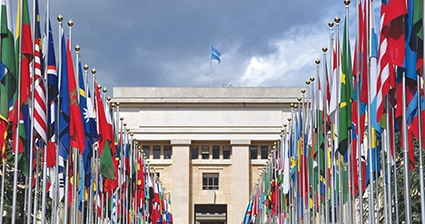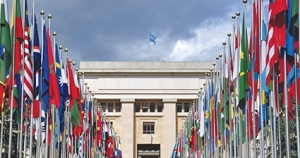35th Round of Geneva Talks and its Peripheries
On March 22-23, the 35th round of the Geneva International Discussions took place. As per tradition, the main format for discussing Georgia’s occupied territories involved official parties from Georgia, the Russian Federation, as well as OSCE, UN, and EU representatives and the US as co-chairs of the format. Representatives of the de facto governments of Abkhazia and South Ossetia were also invited.
The Georgian Foreign Ministry (MFA) says special attention during this round was paid to the grave human rights situation in the occupied territories, including new discriminative regulations targeted against ethnic Georgians, as well as the negative impact of the so-called borderization process on the daily lives of the local Georgian population.
Davit Dondua, head of the Georgian delegation of the MFA, said prior to the event that his team hopes that other participants alongside Georgia will approach the negotiations responsibly and ensure that the issues on the agenda are discussed in a constructive manner.
Optimistically, the discussion faced a palpable aftermath leading the parties to agree on restoration of the Gali Incident Prevention and Response Mechanism - which ceased to operate in 2012. The MFA says the restoration of the Mechanism will positively contribute to pragmatically addressing the security and humanitarian needs of the local population.
Yet prior to the Talks, the Russian Foreign Ministry on Monday released a statement claiming that Tbilisi is actively making anti-Russian outleaps.
The statement emphasized that during the Karasin-Abashidze meeting - a format set between Russia-Georgia in the absence of diplomatic ties – Russia called on the partners to be moderate in terms of their ‘PR-exercises’ in order to prevent damaging normalization of the bilateral relations between the two countries.
The Russian MFA underlined that the ‘Georgian propaganda’ negatively affects the atmosphere surrounding the Geneva Talks, and highlighted as an example the Georgian MFA’s quarterly reports on human rights in its occupied regions.
Russian government-supported information agency Sputnik then spread information announcing the alleged opening of a diplomatic office in Rome by the de-facto South Ossetian government. The report said that after three years of laborious work, Ossetia was able to open its representation in the Italian capital, hoping for Italy’s support in terms of recognizing South Ossetia’s independence.
The story immediately triggered a public outcry in Georgia. Georgian Ambassador to Italy, Kakha Sikharulidze declared the information disseminated through some websites should not be given credit and explained that the country of his diplomatic residence respects Georgia’s territorial integrity and “such a thing should be ruled out.”
Following the report, the Georgian MFA also stated that Georgia and Italy are firmly cooperating on the track of Georgia’s non-recognition policy and Italy honors Georgia’s sovereignty as well as territorial integrity.
There were further surprises last week in addition to those mentioned above. Abkhazia’s so-called representatives participated in the well-known annual tourism exposition held in Paris, 17-20 March. Georgia’s ex-Ambassador to France, Mamuka Kudava, criticized the Georgian government for neglecting the issue of Abkhazia’s non-recognition policy.
Kudava complained that the government must be attentive with regard to some world renowned agricultural and tourism fairs in order to prevent ‘such lapses’ in the future. He urged for continued efforts started by their predecessors to take care of Georgia’s territorial integrity.
Comment from the author
Russia and Georgia have fought a grave war for Abkhazia which has been a sovereign part of Georgia for centuries. The currently Russian-occupied region in Western Georgia faces deadly stagnation in almost every segment, including economy, education and security. The Russian government, a key protector of Abkhazia’s puppet regime, has provided some limited subsidies for the Abkhazian residents at the price of utilizing the region for military purposes in the Caucasus region.
Although over 200,000 Georgians were forcefully displaced from Abkhazia as a result of Russia’s ethnic cleansing in 1993, some 30,000 Georgians still remain in Gali district. The main concern of the Georgian government has been the gross violation of fundamental rights of those Georgians living under permanent pressure of both Abkhaz and Russian forces.
The Geneva International Talks was established following the Russia-Georgia war of August 2008, which ended with the cutting of diplomatic ties between the two countries. Georgia supported the format which would allow some essential humanitarian measures to be taken in order to protect the rights of Georgians in Abkhazia and Tskhinvali regions, as well as for work to be carried out on ultimate peaceful resolution of both conflicts. In addition, the Geneva format has been unprecedented as three moderating parties of the US, the UN, the EU and the OSCE prevent the Russian side from exerting direct diplomatic pressure on Georgia.
The 36th round of the Geneva Talks will be held on 14-15 June.
Zviad Adzinbaia












